Nature vs Nurture
1/18
There's no tags or description
Looks like no tags are added yet.
Name | Mastery | Learn | Test | Matching | Spaced |
|---|
No study sessions yet.
19 Terms
The Nature vs Nurture Debate
= concerned with the extent to which aspect of behaviour are a product of inherited or acquired characteristics
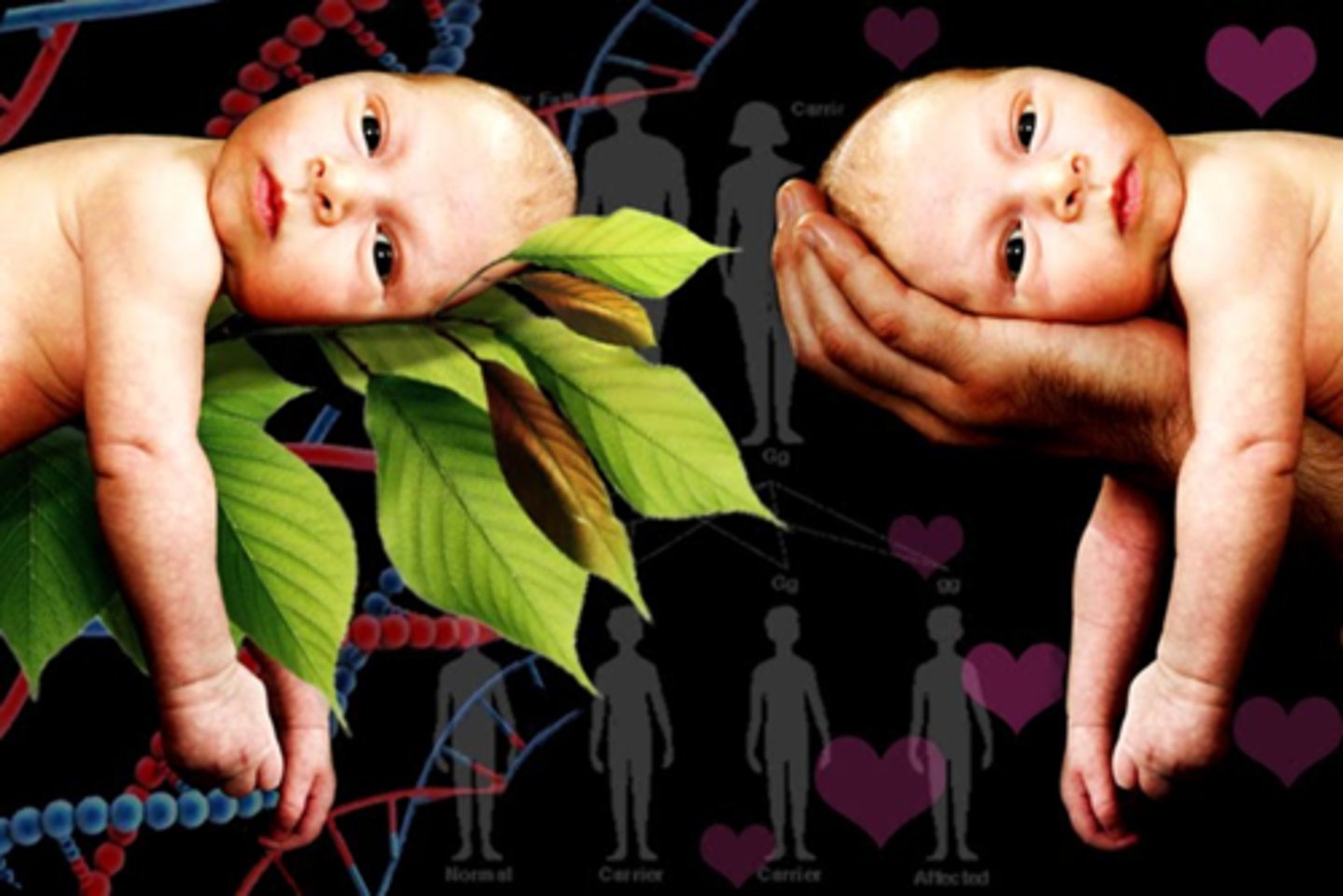
Nature
those who argue the nature arguments = nativists
Early nativists like Rene Descartes (1596-1650) argued that all human characteristics were innate and the result of heredity
Hereditary
= the genetic transmission of mental and physical characteristics from one generation to the other
The Heritability Coefficient
= used to assess heredity
... a number between 0 and 1 to which indicates the extent to which a characteristic has a genetic basis
0 = no evidence to suggest a genetic basis
0.5 = general heritability figure for IQ, meaning both genetics and environment play and important part in its development
1.0 = completely genetically determined e.g., eye colour
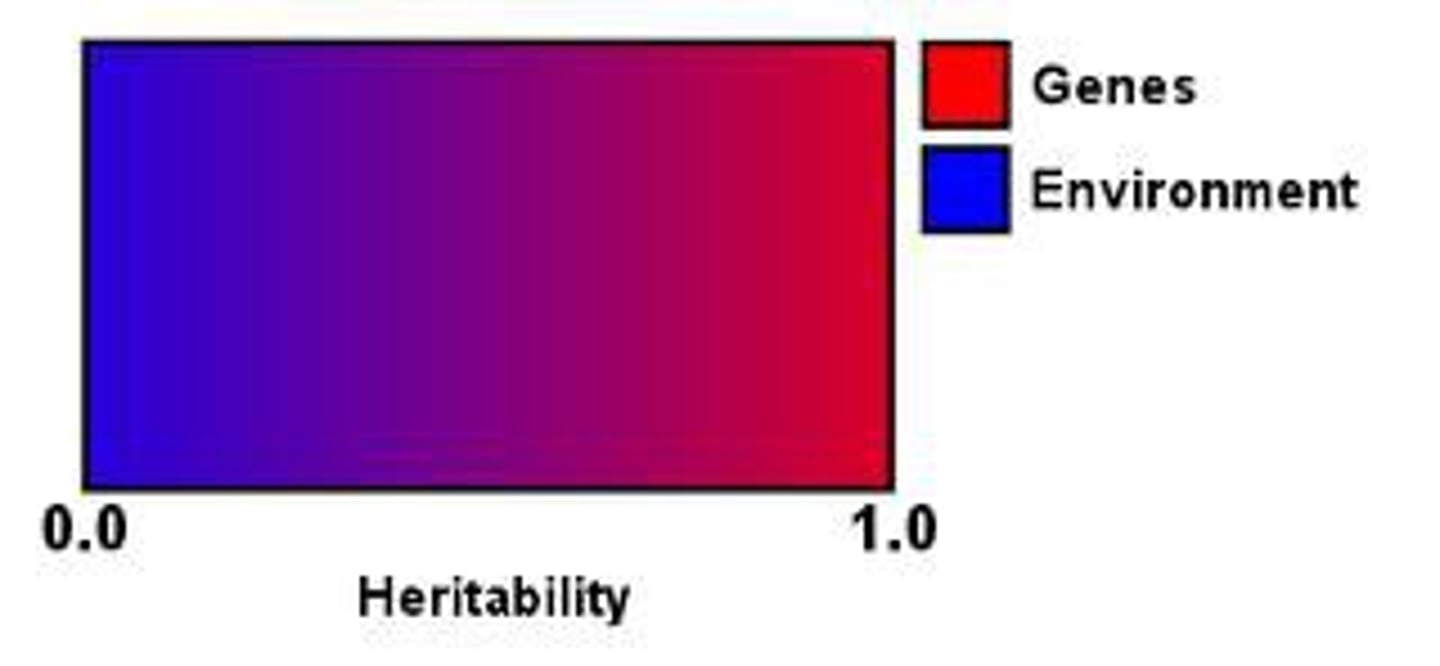
Nurture
those who argue the nurture side of the debate are known as Empiricists
John Locke (1632-1704) argued that at birth "the mind is a blank slate on which learning, and experience write"
The argument that the environment was the key contributor to individual characteristics, later became an important feature in the behaviourist approach
Richard Lerner: Levels of Environment
1. Pre-natal
2. Post-natal
3. Cultural and historical
Nature or Nurture?
Practically, the answer is both
=> Splitting the two and arguing one side is impossible
=> The environment begins to affect development as soon as a child is born, maybe even before
... this means we simply cannot investigate nature or nurture in isolation
e.g., it is impossible to tell whether high concordance rates in twin studied are due to shared genetics, or the shared environment the twins are raised in
=> Modern psychology therefore explores the relative contributions of each influence in terms of what we do and how we think
The interactionist approach
... attachment between a parent and child is a two-way street
- The child's innate temperament will influence the way its parents respond to it, and their responses will in turn affect the child's behaviour (Belsky 1987)
- Nature is creating nurture and heredity & the environment are interacting
Gene and Environment Interaction - Scarr & McCartney
Scarr and McCartney (1983)
... developed a theory of gene and environment interaction that has 3 types that points to a complex multi-layered relationship between nature and nurture
Passive interaction
Evocative interaction
Active interaction
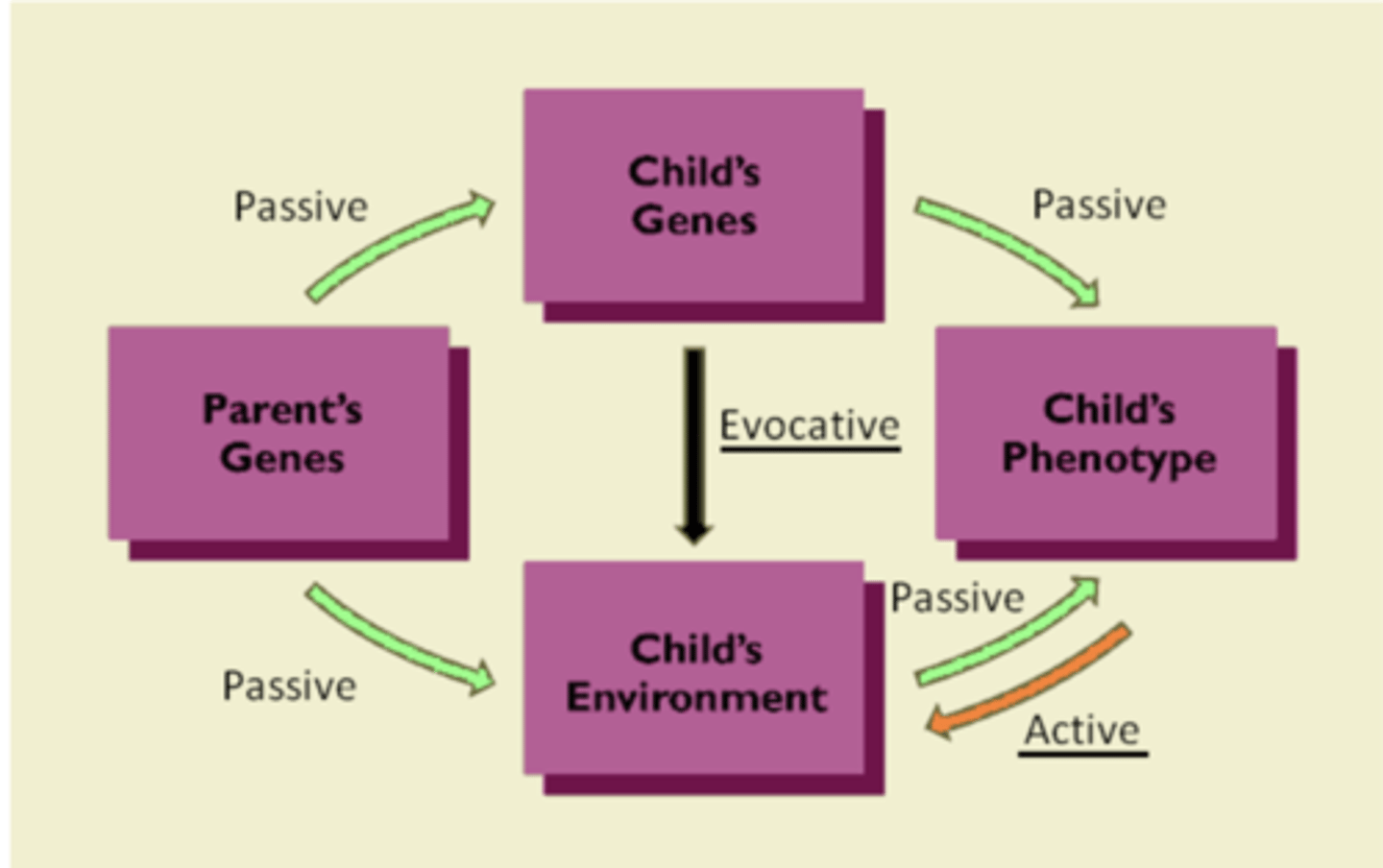
Passive Interaction
Parents genes influence how they treat their children
e.g., musically gifted parents are likely to encourage their children to engage in music
Evocative Interaction
The child's genes influence and shape the environment in which they grow up in
e.g., the musically talented child will be chosen for school concepts and given other special opportunities
Active Interaction
The child creates its own environment through the people and experiences it selects
e.g., the child itself chooses other similarly talented musical friends and seeks out musical opportunities
Diathesis Stress Model
... explores how heredity and the environment interact with regards to mental illness
=> The model suggests that psychopathological conditions are caused in the first instance by agentic vulnerability (diathesis) but are only expressed when triggered by an environmental trigger (stress)
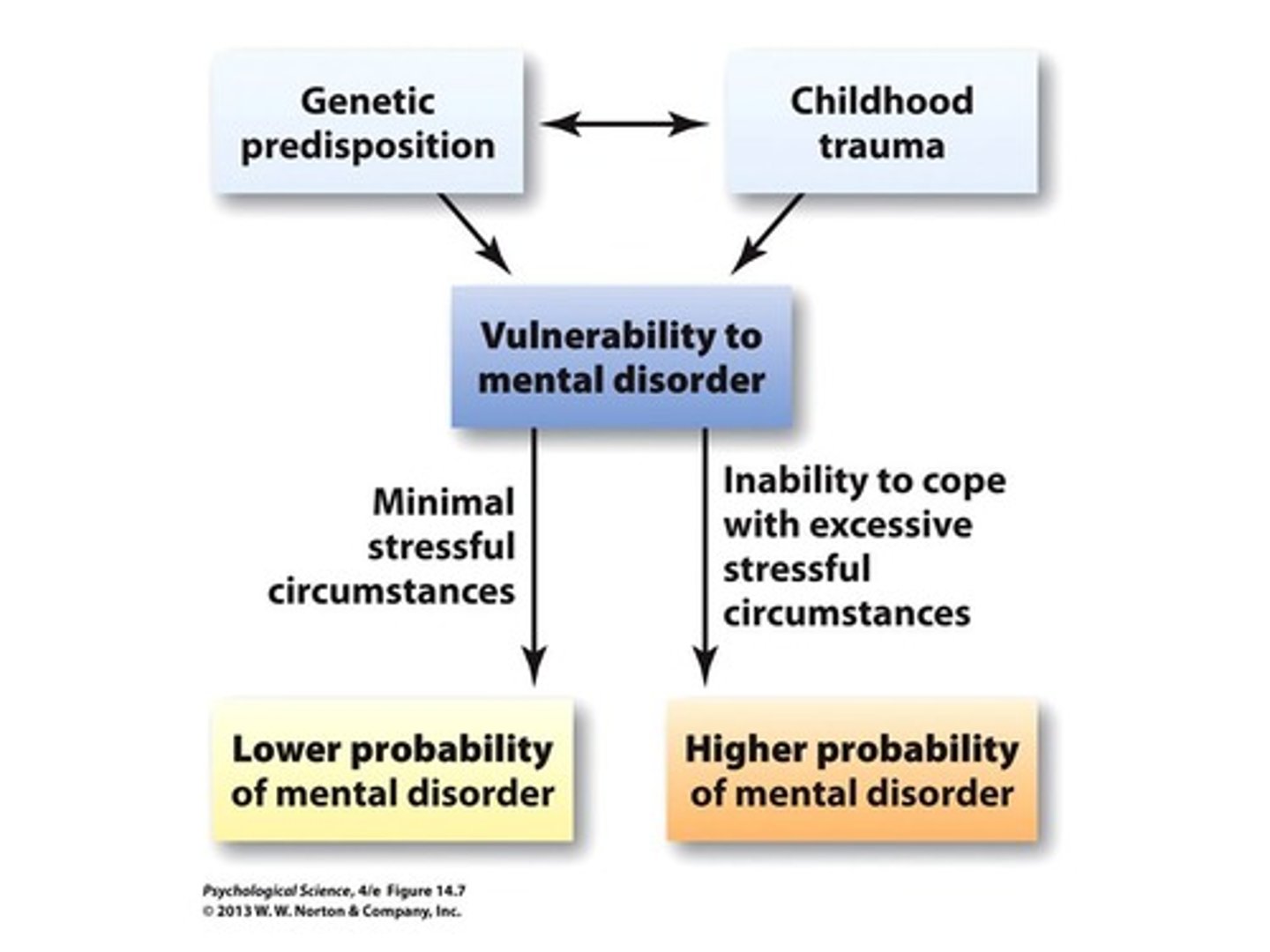
examples of diathesis stress models - Finish Adoptees study: Tienari et al. (2004)
... Discovered that those most likely to develop schizophrenia have biological relatives with a history of the disorder (Genetic vulnerability)
and
had dysfunctional relationships with their adopted families (environmental stressor/trigger)
Epigenetics
= the change in our genetic activity, without actually changing our genetic code
... This change happens throughout our lives, as a result of interactions with the environment, the lifestyles we lead, and events we encounter
e.g.,
smoking, diet, exposure to pollution, war, famine, and disease leave epigenetic "marks" on our DNA
- These marks tell our bodies what genes to use and which to ignore
- These can influence gene activity of our children and grandchildren, and so introduces a third element to the debate
... the influence of the life experience of previous generations
Dias & Ressler 2014 - Epigenetics
1. gave lab mice electric shocks every time they were exposed to the smell of acetophenone (a chemical used for making perfume)
2. behaviourist approach and conditioning, mice showed fear every time they smelt the scent
3. the mice's children also feared the smell despite never having smelt the chemical before or having been exposed to the shocks
4. so did the mice's grandchildren, showing epigenetics through generations
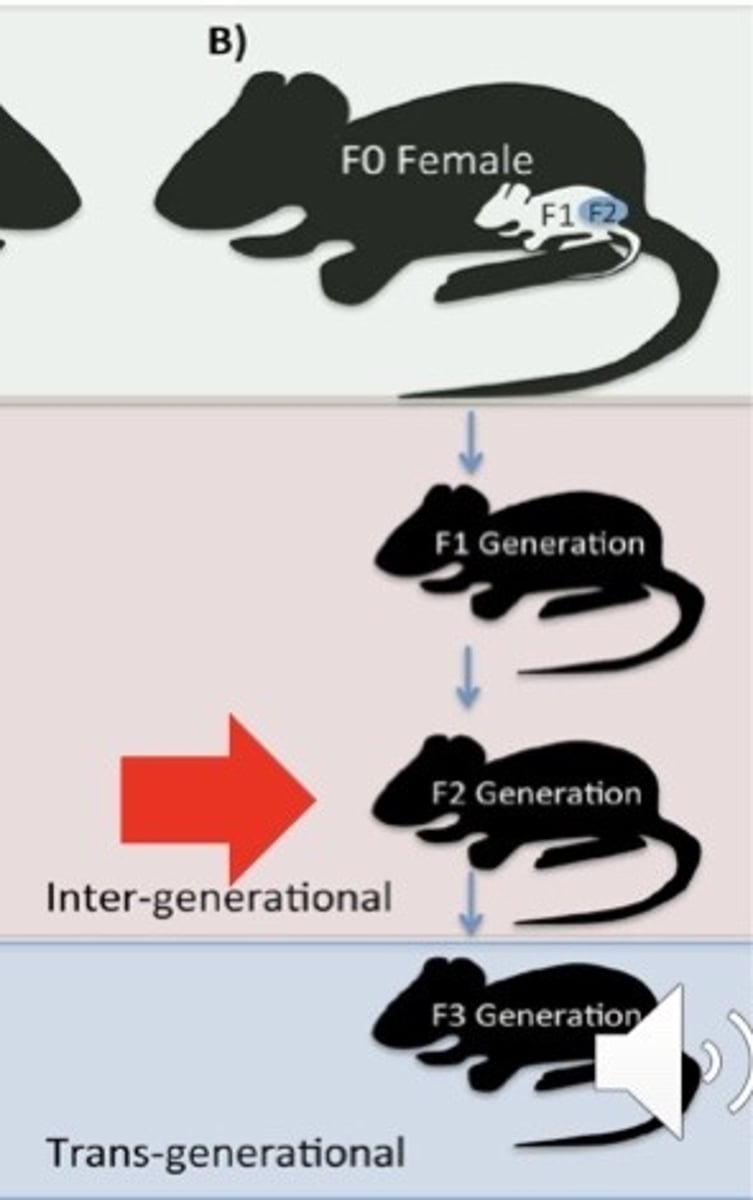
A03 NEGATIVE implications of nativism
P
A reason as to why we cannot solely take a nature stance is because nativists argue that "anatomy is destiny", which is an extremely deterministic stance to take
EX
This argument has led to incredibly controversial research which attempts to link race, genetics and intelligence to the Eugenics Policy, a movement which aims to improve the genetic composition of the human race.
EV
For example, Nazi Germany and Hitlers Regime were built on the concept that the Aryan race was superior to any other. Individuals with blonde hair, blue eyes, and an athletic build were seen as the epitome of Aryan, and the Nazi party promoted this idea that glorified the German population as members of the superior race. This then led the denigration of Jews, Black people, and Roma as "non-Aryan", subsequently leading to the Holocaust in an attempt to "exterminate" them.
EXT
In addition to this, this argument also causes issues for our current legal system. If behaviour is entirely the result of nature, with biological influences beyond our control, then how do we justify punishing crimes and wrong doings as the person has no free will over their actions.
LB
Due to this, the nature argument should not be relied upon as an explanation for behaviour by itself, and the environment must be considered as an influence.
A03 NEGATIVE implications of empiricism
P
Equally, the empiricist argument may be seen as socially sensitive because it suggests that all behaviour can be influenced or even controlled by altering the environment.
EX
If we believe that behaviour can be shaped, such as in therapy, trying to selectively reinforced desirable behaviour whilst punishing or ignoring undesirable behaviours, this has the potential to be abused by governments or societies to control and manipulate people.
EV
For example, behaviour shaping could be used to advocate a model of society and inflict certain behaviours onto a groups of individuals, possibly for the benefit of a political party or government. This may be seen as controversial as, when taken into the extreme, can eradicate diversity and the uniqueness of individuals that make them human beings.
EXT
Furthermore, there is the issue of the shared and unshared environment, how being related and from the same households and still lead to different life experiences, as first investigated by Dunn and Plomin (1990). They suggested that individual differences mean that we all experience events from our own perspectives and therefore they'll have different impacts on our behaviours. For example, age and temperament could mean a parental divorce means different things to each sibling and would have different impacts on their future behaviour.
LB
Due to this contradictory, it is impossible to argue only one side of the debate as we simply cannot measure the extent of either side in isolation.
A03 Interactionist Approach
P
As it is evident that the interactionist approach is required, constructivism can be used to explain how behaviour is shaped by both nature and nurture
EX
Constructivism is based on the idea that people can create their own nurture by seeking environments that are suited to their nature, through what Plomin refers to this as "Niche-Picking".
EV
For example, a naturally aggressive child is likely to feel more comfortable around children who show similar aggressive behaviours and will therefore choose their environment accordingly.
EXT
The concept that behaviours interact can also be shown by epigenetics, which refers to a change in our genetic activity without actually changing our genetic code and may also influence the genetic makeup of our offspring. Whilst they at first have a biological basis, these changes are caused by our interaction with the environment and stimuli we encounter. In Dias and Ressler's Mouse Study (2014), lab mice were electric shocked every time they were exposed to the smell of the chemical acetophenone. Consequently, the mice were conditioned and responded fearfully whenever the smelt the chemical, however, it was also shown that remarkably, the mice's children and grandchildren also responded fearfully to the smell despite never actually having been exposed to it nor the shocks.
LB
The evidence provided by constructivism and epigenetics provides us with useful information about the relationship between biological factors inherited at birth and the processes of learning from environmental stimuli we encounter, and how this offers a more complete and comprehensive explanation of behaviour.